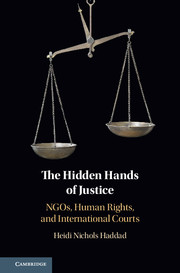Book contents
- The Hidden Hands of Justice
- The Hidden Hands of Justice
- Copyright page
- Dedication
- Contents
- Figures
- Tables
- Acknowledgments
- Abbreviations
- Introduction
- 1 Mapping NGO Participation
- 2 Seeking Voice at the European Court of Human Rights
- 3 Revitalizing the Inter-American Human Rights System
- 4 Rearing the Fledgling International Criminal Court Part I
- 5 Rearing the Fledgling International Criminal Court Part II
- Conclusion
- Book part
- References
- Index
3 - Revitalizing the Inter-American Human Rights System
Published online by Cambridge University Press: 27 July 2018
- The Hidden Hands of Justice
- The Hidden Hands of Justice
- Copyright page
- Dedication
- Contents
- Figures
- Tables
- Acknowledgments
- Abbreviations
- Introduction
- 1 Mapping NGO Participation
- 2 Seeking Voice at the European Court of Human Rights
- 3 Revitalizing the Inter-American Human Rights System
- 4 Rearing the Fledgling International Criminal Court Part I
- 5 Rearing the Fledgling International Criminal Court Part II
- Conclusion
- Book part
- References
- Index
Summary
- Type
- Chapter
- Information
- The Hidden Hands of JusticeNGOs, Human Rights, and International Courts, pp. 84 - 108Publisher: Cambridge University PressPrint publication year: 2018



